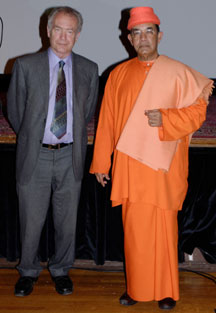
CHICAGO “The Intellectual Legacy of Christopher Bayly: a Conversation” at University of Chicago (UC) Franke Institute for the Humanities, April 29 commemorated this first Indian Ministry of Culture Vivekananda Visiting Professor (2014-2015), who died of a heart-attack, April 18.
Eulogies came from fellow historians, especially former students: Professors Dipesh Chakrabarty, Jennifer Pitts, David Armitage (Harvard), Ajay Skaria (Minnesota), Muzaffar Alam, Michael Dodson (Indiana University), Fredrik Albritton Jonsson and CB’s research assistant Daniel Morgan. Susan Bayly, his wife, had come from U.K.
CB was a pre-eminent scholar of British imperial and world history. Traits praised included his intellectual and personal generosity, eagerness to share with and learn from peers and students, as equals, while sticking to his own positions, and wit brought to matters serious.
Chakrabarty characterized his oeuvre as a “history of the world in 20th C.” Instead of big coastal cities, such as Calcutta and Madras, CB chose to study inland urban elite with strong rural roots. He discovered big facts, such as control of Banaras by nine families. His work on “Hindu populism” focused on Madan Mohan Malaviya, whose journal CB introduced into libraries. In a controversial move, CB gave colonialism a long history into the 18th C and even earlier: while Western writers had underestimated its disruptive nature, Indians did the opposite. ‘Subalternist’ Chakrabarty, who now teaches CB’s view of history, characterized the Englishman as a magnanimous winner.
For Dodson, CB’s two core works carefully account for economic, social and cultural complicities between rulers and natives that reveal the nature of colonial rule as stability in change through mutual advantage. Three key elements are role of Indian intermediaries (e.g., Banarasi merchants and banking families), how British expansion rarely went unchallenged, and compatibility between British and late Mughal political culture in 18th Century.
Skaria, CB’s former Ph.D. student at Cambridge, said that scholarly meetings took place mostly in the pub. Though already very loyal to the subaltern school, Skaria read CB, then only 43, with frustration, exhilaration and finally admiration. CB was “developing a range of mutually dissonant insights and the vitality of the 18th C is due to this very unruliness.”
Describing the rise of new Hindu classes (Agarwals, Khatris, etc.) and Muslim service gentry and literate families in small towns, CB turned upside down the prevailing picture of 18th C. India as “stagnation in all spheres,” said Moghul historian Alam. CB’s article on the precolonial history of communalism, e.g., mobilization of religious symbols (cow, etc.), was seen by nationalist scholars as disguised apologia for colonialism.
Jonsson spoke of CB’s relevance to environmental thought and climate change. Industrialization was global from the start and rise of capital was a not a force in itself but anchored in preexisting processes of change. Africanist Emily Osborn noted how CB has made our world simultaneously more unified and complex. History is not mono-causal: multiple dispersed actors, not just Western elites, contributed to modernity.
Pitts noted CB was “”impelled by utopian hope for a cosmopolitan liberal future” as “the least bad practice of political life.” He admired Ram Mohun Roy in the face of the East India Company’s racialism. CB’s formative experiences in Banaras in the 60s had continued to shape his thinking but in a liberal vein. It was CB who conceived and inspired the “New Directions in Global History” UC conference held barely two weeks earlier.
CB did not like being called a “global historian” because he was so attentive to and respectful of local context, noted Armitage, whose encounter with CB “25 years ago was decisive for me.” Others had pointed out that CB’s “local histories” were informed, conversely, by a global perspective.
CB’s “intellectual companion and cherished friend,” Susan, who had known him for 35 years, “even before we became a couple,” told the gathering “you’ve given me a most marvellous gift.” She recalled the exhilaration of living in a “permanent dinner seminar,” arguing ferociously about everything, for he loved to refine his ideas.
CB shared ongoing chapters and ideas with students, and files are being recovered here to put together his final book. She concluded with emotion that Chris, who “loved being in Chicago,” would have approved “because I didn’t cry in front of you.”






